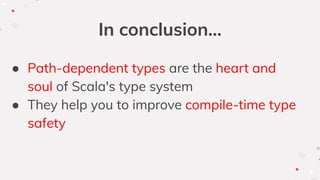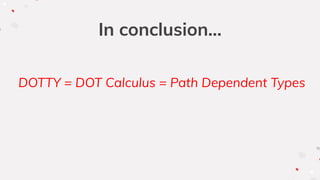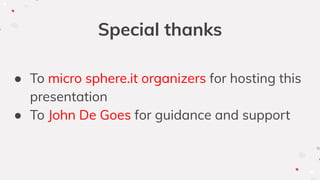Exploring type level programming in Scala
- 4. Agenda ● Motivations around Type-Level Programming in Scala ● Background ○ Dependent types ○ Path-dependent types ○ Abstract type members ● Examples of libraries that use Type-Level Programming
- 6. Why Type-Level Programming? ● We turn to Scala for type-safety ● But… Sometimes it’s not enough!
- 7. Concrete example: Spark DataFrame API We have lots of potential for runtime bugs!
- 8. Concrete example: Spark DataFrame API df.select( $"username", $"tweet" )
- 9. Concrete example: Spark DataFrame API Error: org.apache.spark.sql. AnalysisException: cannot resolve '`username`'
- 10. Concrete example: Spark DataFrame API df.select( $"timestamp" * 10 )
- 11. Concrete example: Spark DataFrame API Error: org.apache.spark.sql. AnalysisException: cannot resolve '(`timestamp` * 10)' due to data type mismatch
- 12. Concrete example: Spark DataFrame API df.filter( $"text" === true ) // Does not fail
- 13. Concrete example: Spark DataFrame API df.select( $"text" / 1000 ) // Does not fail
- 15. Can we do better? Scala has a VERY powerful type system, why not use it?
- 16. Concrete example: Spark with Frameless Frameless helps us to eliminate a lot of bugs… At compile time!
- 17. Concrete example: Spark with Frameless tds.select( tds('username), tds('tweet) )
- 18. Concrete example: Spark with Frameless // Error: No column Symbol with shapeless.tag.Tagged[Str ing("username")]
- 19. Concrete example: Spark with Frameless tds.select( tds('timestamp) * 10 )
- 20. Concrete example: Spark with Frameless // Error: overloaded method value * with alternatives [...] cannot be applied to (Int)
- 21. Concrete example: Spark with Frameless tds.filter( tds('text) === true )
- 22. Concrete example: Spark with Frameless // Error: overloaded method value === with alternatives [...] cannot be applied to (Boolean)
- 23. Concrete example: Spark with Frameless tds.select( tds('text) / 1000 )
- 24. Concrete example: Spark with Frameless // Error: overloaded method value / with alternatives [...] cannot be applied to (Int)
- 25. In conclusion... Type-level Programming lets you eliminate bugs at compile-time
- 26. In conclusion...
- 27. Our focus today: Dependent types Dependent types are the heart of Type-Level Programming in Scala
- 29. What are Dependent Types? ● Dependent Types are types that depend on values. ● With this, we remove the usual separation between the type and value worlds.
- 30. What are Dependent Types? ● Scala is not a fully dependently typed language. ● However, it supports some form of Dependent Types, which is called Path Dependent Types.
- 31. How we define Path Dependent Types? ● In Scala, we can define nested components ● For example, a class inside a trait, a trait inside a class, etc.
- 32. How we define Path Dependent Types? sealed trait Foo { sealed trait Bar } val foo1 = new Foo {} val foo2 = new Foo {} val a: Foo#Bar = new foo1.Bar {} // OK val b: Foo#Bar = new foo2.Bar {} // OK val c: foo1.Bar = new foo1.Bar {} // OK val d: foo2.Bar = new foo1.Bar {} // Required: foo2.Bar, Found: foo1.Bar
- 33. How we define Path Dependent Types? ● Another useful tool is Abstract Type Members, which are types we don’t know yet and that we can define later trait Bar { type T }
- 34. Example 1: Merging Files Define a merge function, which should take: ● A list of files ● A merge strategy: Single/Multiple/None ● A callback function: Which should expect: ○ A single file if merge strategy is Single ○ A list of files if merge strategy is Multiple ○ A unit value if merge strategy is None
- 35. Example 1: Merging Files import java.io.File sealed trait MergeStrategy { type Output } object MergeStrategy { case object Single extends MergeStrategy { type Output = File } case object Multiple extends MergeStrategy { type Output = List[File] } case object None extends MergeStrategy { type Output = Unit } } def mergeFiles(files: List[File]): File = ???
- 36. Example 1: Merging Files def merge[T](files: List[File], mergeStrategy: MergeStrategy) (f: mergeStrategy.Output => T): T = mergeStrategy match { case MergeStrategy.Single => f(mergeFiles(files)) case MergeStrategy.Multiple => f(files) case MergeStrategy.None => f(()) }
- 37. Example 1: Merging Files
- 38. Example 1: Merging Files def merge[O, T]( files: List[File], mergeStrategy: MergeStrategy { type Output = O } )(f: O => T): T = mergeStrategy match { case MergeStrategy.Single => f(mergeFiles(files)) case MergeStrategy.Multiple => f(files) case MergeStrategy.None => f(()) }
- 39. Example 1: Merging Files val files: List[File] = ??? merge(files, MergeStrategy.Single) { file: File => // Do some processing } merge(files, MergeStrategy.Multiple) { files: List[File] => // Do some processing } merge(files, MergeStrategy.None) { _: Unit => // Do some processing }
- 40. Example 2: Merging Elements Define a merge function, which should take: ● A list of elements of any type ● A merge strategy: Single/Multiple/None ● A callback function: Which should expect: ○ A single element if merge strategy is Single ○ A list of elements if merge strategy is Multiple ○ A unit value if merge strategy is None
- 41. Example 2: Merging Elements sealed trait MergeStrategy { type Output[_] } object MergeStrategy { case object Single extends MergeStrategy { type Output[A] = A } case object Multiple extends MergeStrategy { type Output[A] = List[A] } case object None extends MergeStrategy { type Output[_] = Unit } } def mergeElements[E](elements: List[E]): E = ???
- 42. Example 2: Merging Elements def merge[E, O[_], T]( elements: List[E], mergeStrategy: MergeStrategy { type Output[A] = O[A] } )(f: O[E] => T): T = mergeStrategy match { case MergeStrategy.Single => f(mergeElements(elements)) case MergeStrategy.Multiple => f(elements) case MergeStrategy.None => f(()) }
- 43. Example 2: Merging Elements val messages: List[String] = ??? merge(messages, MergeStrategy.Single) { message: String => // Do some processing } merge(messages, MergeStrategy.Multiple) { messages: List[String] => // Do some processing } merge(messages, MergeStrategy.None) { _: Unit => // Do some processing }
- 44. In conclusion... ● Path-dependent types are the heart and soul of Scala's type system ● They help you to improve compile-time type safety
- 45. In conclusion... DOTTY = DOT Calculus = Path Dependent Types
- 47. Examples of libraries that use Type Level Programming ● Shapeless: Generic programming ○ Generic Product Type: HList ○ Generic Sum Type: Coproduct
- 48. Examples of libraries that use Type Level Programming ● Frameless: Expressive types for Spark
- 49. Examples of libraries that use Type Level Programming ● Refined: Refinement types
- 50. Examples of libraries that use Type Level Programming ● ZIO SQL: Type-safe SQL queries
- 51. References ● Dependent types in Scala, blog post by Yao Li ● Type Level Programming in Scala step by step, blog series by Luigi Antonini ● The Type Astronaut’s Guide to Shapeless Book, by Dave Gurnell ● Introduction to Apache Spark with Frameless, by Brian Clapper
- 52. Special thanks ● To micro sphere.it organizers for hosting this presentation ● To John De Goes for guidance and support
- 53. Thank You!


















![Concrete example: Spark with Frameless
// Error:
No column Symbol with
shapeless.tag.Tagged[Str
ing("username")]](https://image.slidesharecdn.com/exploringtype-levelprogramminginscalav2-201208150451/85/Exploring-type-level-programming-in-Scala-18-320.jpg)

![Concrete example: Spark with Frameless
// Error:
overloaded method value
* with alternatives
[...] cannot be applied
to (Int)](https://image.slidesharecdn.com/exploringtype-levelprogramminginscalav2-201208150451/85/Exploring-type-level-programming-in-Scala-20-320.jpg)

![Concrete example: Spark with Frameless
// Error:
overloaded method value
=== with alternatives
[...] cannot be applied
to (Boolean)](https://image.slidesharecdn.com/exploringtype-levelprogramminginscalav2-201208150451/85/Exploring-type-level-programming-in-Scala-22-320.jpg)

![Concrete example: Spark with Frameless
// Error:
overloaded method value /
with alternatives [...]
cannot be applied to
(Int)](https://image.slidesharecdn.com/exploringtype-levelprogramminginscalav2-201208150451/85/Exploring-type-level-programming-in-Scala-24-320.jpg)




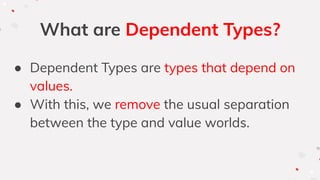

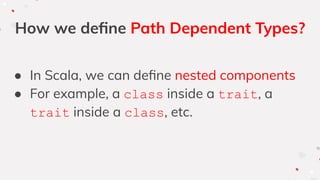


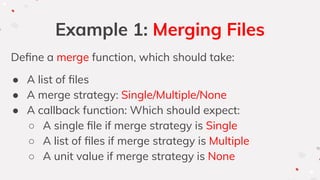
![Example 1: Merging Files
import java.io.File
sealed trait MergeStrategy {
type Output
}
object MergeStrategy {
case object Single extends MergeStrategy { type Output = File }
case object Multiple extends MergeStrategy { type Output = List[File] }
case object None extends MergeStrategy { type Output = Unit }
}
def mergeFiles(files: List[File]): File = ???](https://image.slidesharecdn.com/exploringtype-levelprogramminginscalav2-201208150451/85/Exploring-type-level-programming-in-Scala-35-320.jpg)

(f: mergeStrategy.Output => T): T =
mergeStrategy match {
case MergeStrategy.Single => f(mergeFiles(files))
case MergeStrategy.Multiple => f(files)
case MergeStrategy.None => f(())
}](https://image.slidesharecdn.com/exploringtype-levelprogramminginscalav2-201208150451/85/Exploring-type-level-programming-in-Scala-36-320.jpg)

(f: O => T): T =
mergeStrategy match {
case MergeStrategy.Single => f(mergeFiles(files))
case MergeStrategy.Multiple => f(files)
case MergeStrategy.None => f(())
}](https://image.slidesharecdn.com/exploringtype-levelprogramminginscalav2-201208150451/85/Exploring-type-level-programming-in-Scala-38-320.jpg)
![Example 1: Merging Files
val files: List[File] = ???
merge(files, MergeStrategy.Single) { file: File =>
// Do some processing
}
merge(files, MergeStrategy.Multiple) { files: List[File] =>
// Do some processing
}
merge(files, MergeStrategy.None) { _: Unit =>
// Do some processing
}](https://image.slidesharecdn.com/exploringtype-levelprogramminginscalav2-201208150451/85/Exploring-type-level-programming-in-Scala-39-320.jpg)

![Example 2: Merging Elements
sealed trait MergeStrategy {
type Output[_]
}
object MergeStrategy {
case object Single extends MergeStrategy { type Output[A] = A }
case object Multiple extends MergeStrategy { type Output[A] = List[A] }
case object None extends MergeStrategy { type Output[_] = Unit }
}
def mergeElements[E](elements: List[E]): E = ???](https://image.slidesharecdn.com/exploringtype-levelprogramminginscalav2-201208150451/85/Exploring-type-level-programming-in-Scala-41-320.jpg)
![Example 2: Merging Elements
def merge[E, O[_], T](
elements: List[E],
mergeStrategy: MergeStrategy { type Output[A] = O[A] }
)(f: O[E] => T): T =
mergeStrategy match {
case MergeStrategy.Single => f(mergeElements(elements))
case MergeStrategy.Multiple => f(elements)
case MergeStrategy.None => f(())
}](https://image.slidesharecdn.com/exploringtype-levelprogramminginscalav2-201208150451/85/Exploring-type-level-programming-in-Scala-42-320.jpg)
![Example 2: Merging Elements
val messages: List[String] = ???
merge(messages, MergeStrategy.Single) { message: String =>
// Do some processing
}
merge(messages, MergeStrategy.Multiple) { messages: List[String] =>
// Do some processing
}
merge(messages, MergeStrategy.None) { _: Unit =>
// Do some processing
}](https://image.slidesharecdn.com/exploringtype-levelprogramminginscalav2-201208150451/85/Exploring-type-level-programming-in-Scala-43-320.jpg)
